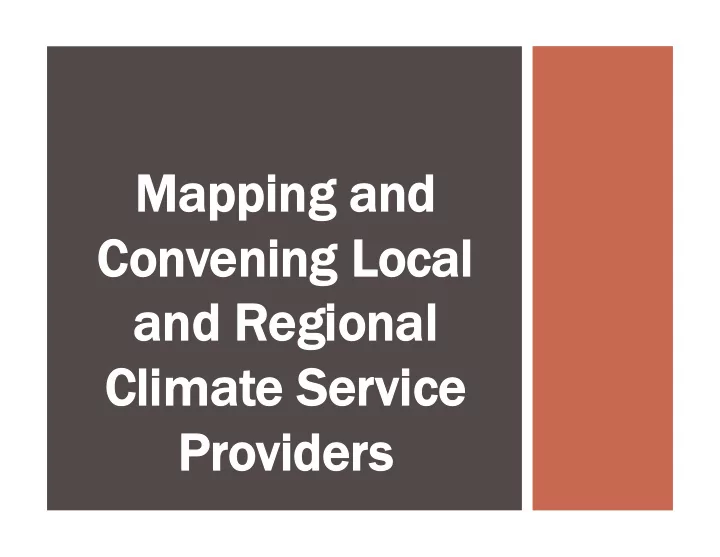

Mapping a and Convening L Local and R Regional Climate S Service Pr Provi vider ers s
OUTLINE 1. Introduction to Resource and Service Landscape 2. Overview of Local Government Survey Results 3. Highlights and Opportunities for Moving Field Forward
RES RESEA EARCH OVER VERVIEW VIEW � Pa Part A: Resource Coding � Inventoried services provided by 89 nonprofit and boundary organizations � Catalogued local or regionally relevant climate adaptation resources � Organized services and resources by coding system � Pa Part B: Surve vey of Local Gove vernments � Focus: Understand resource use, need, barriers, and visions of resilience � +200 local government respondents � Partnership with ICLEI, NLC, and USDN � Part C: Convening of Service Providers and Local Practitioners � May 2014
PA PART A: RESOURCE CODING � 3,400 resources or services coded � Codebook developed with local practitioners � Coded by: � Type of Resource � Phase of Planning Process Resource Supports � Climate Impact Resource Addresses � Sector of Operation Resource Supports � Geographical Area Served by Resource
BY BY RESOURCE TYPE � Most abundant “types”: � Fact Sheets � Best Practice / Case Studies � Scientific Reports / Data Sources � Least common “types”: � Monitoring and Evaluating Resources � Grants
By P Pha hase o of P Planning P Process � Resources skewed to earlier phases of the adaptation planning process � Fewer resources aimed at the implementation-related activity
By S Sector � Water is far and away the most common sector � Sectors with the few resources identified include: engineering, solid waste, legal, agriculture, health, and vulnerable populations � Nearly 40% of resources are not sector-specific
BY BY IMPACT � Stormwater and flooding as well as sea level rise are the most common impacts addressed � Few resources identified that focus on extreme heat and forest fires � Nearly 55% of resources are not impact-specific
PA PART B: LOCAL PRACTITIONER SU SURVEY Y
LOCAL MOTIVATIONS FOR LO ADAPT AD APTATIO TION A N ACTIO CTION N � Elected officials and staff identified political support as the most important motivator for action � Least common motivators for action include funding, addressing inequalities, and gaining a competitive advantage
WHA WHAT’ T’S BE S BEING U NG USE SED � Most commonly used resources: � Best practices / case studies � Local peers � Scientific reports or articles � Fact Sheets � Resources used infrequently: � Software � Social media � Consulting firms
BAR BARRIERS S
NEEDS NEEDS 80% 80% 70% 70%
RES RESOUR OURCE E AVAILA ILABLE LE VS. . RES RESOUR OURCES ES DES DESIRED IRED
RES RESOUR OURCE E FORMA ORMAT � Most desired format for resources was web, followed by detailed case studies/fact sheets and in person conferences or trainings � Least desired formats include social media and blogs
HI HIGHL GHLIGHT GHTS S � Commonly used resources are often the most abundant types of resources: � Case studies, fact sheets, scientific reports/data sources � Resources coded support earlier phases of the adaptation planning process; fewer at later phases of the planning process � Few resources address a specific climate impact on a specific sector � Lowest rate of usage for software, which also is not an abundant resource/service type � A large percentage of the resources identified are “generic”, meaning they are not specific to a sector, climate impact, geographical area, or phase of the planning process
HI HIGHL GHLIGHT GHTS (1) S (1) � Some identified needs are being filled by existing resources � 77% of respondents indicated wanting information on how other communities are implementing adaptation actions � Second most coded resource type was case studies or best practices � Support for the early phases of adaptation action appears strong: not a significant barrier to action
PA PART C: WORKSHOP PRIORITIES � Peer to peer networking � Communication, collaboration, and community building � Adaptation infrastructure � Economic analysis � Finance � Centralized tools and mechanisms
Thank ¡You! ¡ Missy ¡Stults ¡ Researcher ¡and ¡Doctoral ¡Fellow ¡ ¡ University ¡of ¡Michigan ¡ Missy.stults@gmail.com ¡ ¡ Funding ¡generously ¡provided ¡by ¡the ¡NaDonal ¡Science ¡FoundaDon ¡ Graduate ¡Research ¡Fellowship ¡program ¡
Recommend
More recommend